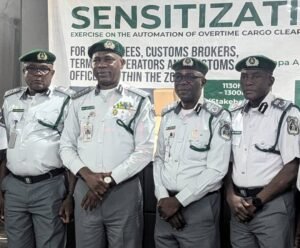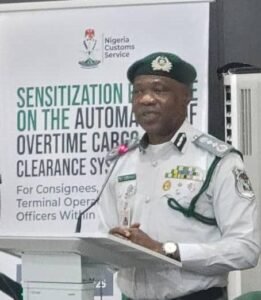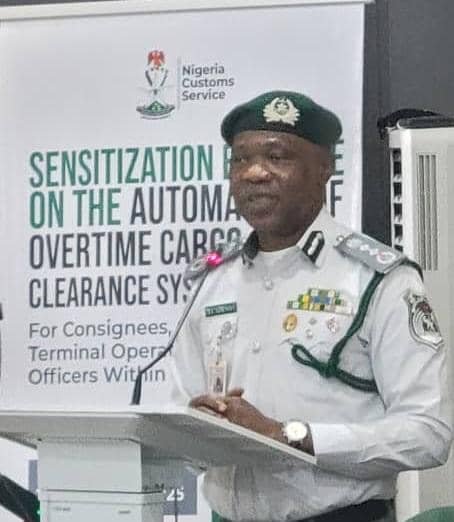
Lagos: The Comptroller-General of the Nigeria Customs Service (NCS), Mr Bashir Adeniyi, says the Service has automated the clearance process for overtime cargoes and extended the window to 120 days to facilitate trade.

(group picture of the management of Customs and stakeholders at the sensitisation programme of Automation Overtime Cargos held in Lagos on Monday)
Adeniyi disclosed this on Monday at a one-day sensitisation programme on the Automation of Overtime Cargo Clearance System for stakeholders.
According to him, the extension will also improve the ease of doing business across the nation’s ports.

(From L-R, Zonal Coordinator Zone ‘A’, Assistant Comptroller General of Customs, Muhammed Babadede, the CGC of Customs, Bashir Adeniyi, Assistant Comptroller General of Customs, Isah Umar, and senior officer at the sensitisation programme of Automation Overtime Cargos held in Lagos on Monday)
The stakeholders include consignees, brokers, terminal operators, and customs officers in Zone ‘A’, Lagos.
He explained that the automation would help resolve delays often caused by abandoned consignments and reduce the volume of letters seeking clearance extensions, which make up nearly 50 per cent of correspondence to his office daily.

“We have created a help desk at the headquarters to prioritise clearance of project cargoes belonging to government agencies.
“Importation is critical to Nigeria’s economic development, and our goal is not just to generate revenue but to ensure goods reach their owners quickly and efficiently,” he said.
Adeniyi added that less than one per cent of cargoes arriving at Nigerian ports in 2024 were classified as overtime and expressed optimism that the new system would reduce this to zero.
He also assured stakeholders of continuous sensitisation sessions to ensure smooth adoption of the process.
The Comptroller-General urged terminal operators, shipping companies, and clearing agents to provide feedback for further improvement.
He noted that some consignments were deliberately abandoned while others faced delays due to network challenges.
“The Overtime Cargo Automation programme is fully developed and ready for deployment.
“This sensitisation is to ensure all stakeholders, terminal operators, shipping companies, and agents, understand the system and work together for success,” Adeniyi said.
In his remarks, Assistant Comptroller-General of Customs, Mr Isah Umar, said that the e-clearance system would simplify procedures, enhance transparency, reduce human interference, and strengthen data integrity for imports and exports.

He explained that the system would also provide automatic records of cargo disposal and harmonise documentation through the use of the Single Goods Declaration (SGD).
Chief Superintendent of Customs, Mr Aliyu Abdulkadir, highlighted that under the Nigeria Customs Service Act 2023, overtime cargoes are subject to disposal after 120 days, while perishable and inflammable items may be disposed of immediately through e-auction or other approved means to prevent accidents.
Similarly, Assistant Comptroller of Customs, Mr Ibrahim Muhammed, walked participants through the ICT processes of the new system.
He said cargoes are classified as overtime after 30 days, with clearance escalated step-by-step from the Area Controller to the zonal level, and to headquarters if unresolved within the stipulated period.
He stressed that the system provides a transparent, efficient, and accountable framework for managing overtime consignments.
Also speaking, the Zonal Coordinator of Zone ‘A’, Assistant Comptroller-General Muhammed Babadede, described NCS as the most digitalised Customs administration in West and Central Africa and commended the Comptroller-General for driving reforms through automation.
The sensitisation session featured interactive discussions, with stakeholders, including shipping companies, terminal operators, importers, exporters, and clearing agents, seeking clarifications on the new process.
Customs management assured them that continuous engagement would be sustained for effective implementation.









